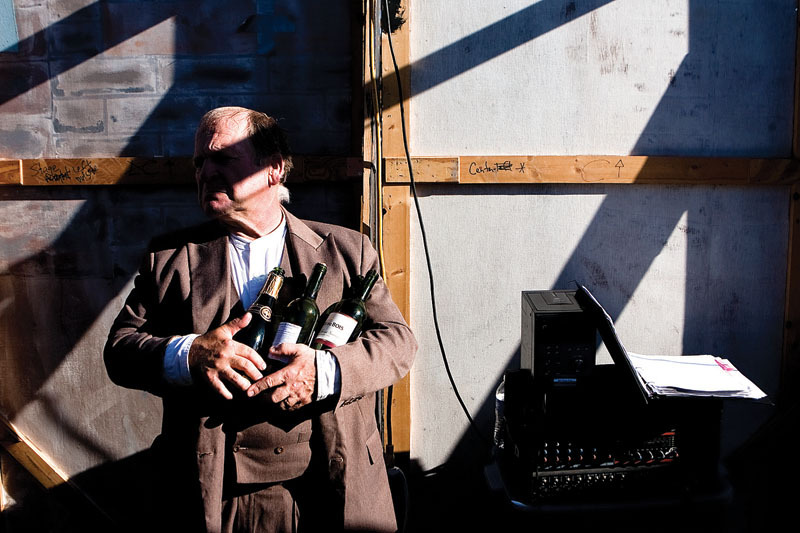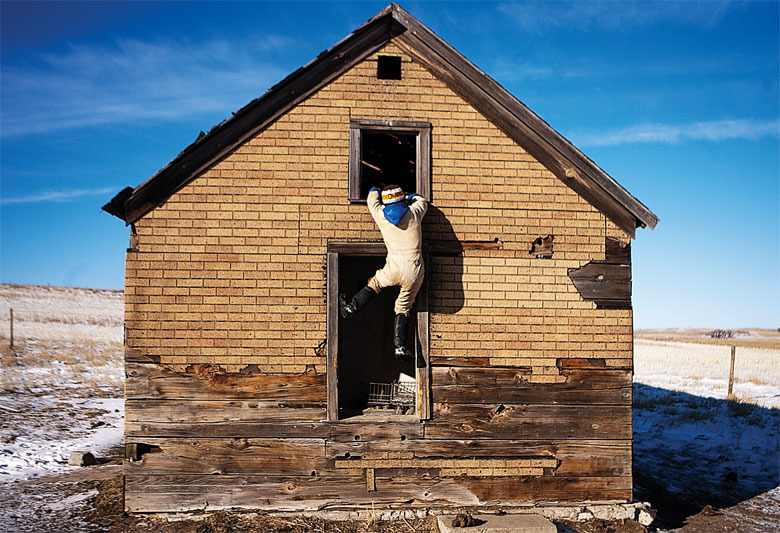
Parkhour practice. Denver, Colorado.

Alex D'Jamoos arrives exhausted to camp Horombo on the second day of hiking Mt. Kilimanjaro. The rocky terrain prevented D'Jamoos from walking on his prosthetic legs and he spent the entire day hiking on his hands. In 2014, D'Jamoos and his companion, Sasha Pokhilko, climbed Africa's tallest mountain on prosthetic legs.

"Downtown Cowboy Mural" was painted on the side of a building in downtown Gillette, Wyo. by local artist Harvey Jackson. Campbell County began its history as a ranching community 100 years ago, but now has been dubbed "The Energy Capital of the Nation" because it is one of the largest coal producing areas in the world. The ten largest coal mines in the United States—the world's second largest coal producing nation—are all located in the Powder River Basin of Campbell County, Wyo.
USE ARROW KEYS OR SCROLLING TO NAVIGATE

Dayton Schneider, Elliott Hill, Kami Riddle, Julie Ekwall and other children play in the Gillette, Wyo. city pool after it opened for the first day of the 2012 season. Rainy, cold weather delayed the pool's official opening one day, but within an hour after opening, people were swimming, splashing, diving and tanning. "It's really fun here," Julie Ekwall said.

A rally in Denver's Civic Center Park to celebrate April 20—known as "420" to marijuana enthusiasts—ended in violence after a man was shot in the leg. Thousands of smokers flocked to Denver for the rally and other marijuana events including High Times magazine's Cannabis Cup. In November of 2012, Colorado was one of two U.S. states to legalize possession of small amounts of marijuana after voters approved Amendment 64.

People scatter after hearing gun shots in Denver's Civic Center Park during a gathering to celebrate marijuana on April 20, 2013. Thousands flocked to Denver for the rally and other marijuana events including High Times magazine's Cannabis Cup. Colorado was one of two U.S. states to legalize possession of small amounts of marijuana after voters approved Amendment 64 in November, 2012.

An Ecuadorian national police officer punches a man in the face in an attempt to pacify him and force him into the paddy wagon that follows the pilgrimage of La Virgen de El Cisne. The man was accused of stealing from pilgrims and although he screamed that he was innocent and that his wife and daughter were still in the crowd, the police were not convinced and put him into the mobile jail that was already packed just a few hours after the beginning of the pilgrimage.

Runners scream and dance while doing the "Harlem Shake" following the Graffiti Run 5K in Denver, Colo.

Mike Harry has lost so much weight from his battle with esophageal cancer that his wedding ring is too big for his finger and so he wears it on a necklace. Harry and his wife Rhiannon were high school friends and married in 2010. This is Mike's fourth battle against cancer and the couple have spent much of their marriage so far dealing with it. “If it weren’t for the cancer, we’d have a happy life,” Mike once said to Rhiannon. “It’s not that it’s not happy,” she replied. “It just would be less complicated.”

Herbertha “Bertie” Johnson has been fighting legal battles for nearly two years trying to hold onto the 17 purebred Brussels Griffon terriers and Pekingese dogs that live in her home. Johnson recently received an official letter from District Judge John R. Perry that ordered her to get rid of 15 of her dogs (she is allowed to keep two) by April 13, 2012. Johnson was upset with the decision, which found that she was in violation of the Crestview neighborhood's covenants, which forbid residents from having more than two dogs, but not the law. "They shouldn't be able to do that kind of crap to a person," she said. "I'm 78 years old and I haven't broken a law in my life, then something like this comes up and I just get railroaded."

"I stand before you a changed man," Steven Harvey said during an emotional speech thanking friends, family, officials and other supporters that came to his graduation from the Campbell County Adult Drug Court. Harvey became the 109th graduate of the intense treatement program, which is an alternative to incarceration.

Although she was happy that she got a good price, Danielle Foster couldn't hold back her tears after selling her goat, which she had spent eight months raising, at the Campbell County Fair. Cows, goats, cows, pigs, sheep, chickens and other animals were auctioned off to the highest bidders for the Youth Livestock Sale that concluded the Campbell County (Wyo.) Fair.

Tel Vineyard (left), helps wrestle a calf during a branding on the Weischedel ranch in Campbell County, Wyo. Brothers Owen Rumph, Dick Rumph and Tom Riggs run around 240 head of cattle on the Weischedel property and around 1430 head total in their business. Branding, vaccinating and castrating new calves is annual task on ranches and friends and family typically help out.

Sheila Schoeppner, left, and her stepdaughter Amy Schoeppner relax at the Transplant House in Miami, Fla., where Sheila has lived for the last eight months following a multivisceral transplant. The Transplant House is a free for families and patients of the University of Miami hospital to stay while recovering from, or preparing for transplant procedures. Amy temporarily moved from her home in Iowa to live with Sheila in the Transplant House and care for her stepmother, who takes more than 20 medications every day and struggles with daily tasks. “Without this place I don’t know what we would do,” Shelia and Amy said about the Transplant House.

David Geible, playing Leonato, waits backstage during the performance of "Much Ado About Nothing" at Gillette College in Gillette, Wyo. Actors traveled from as far away as Lander with the Wyoming Shakespeare Festival Company, which has been producing the "Bard of Avon's" classic plays for Wyoming audiences since 2000.

Wyatt Geis tries to get a look into the attic of an old house that used to belong to the Chaney family and is now part of the Geis ranch in Campbell County, Wyo. The 95-year-old ranch has expanded throughout the years as successive generations bought out surrounding ranches. The original Homestead Act of 1862 allowed people to gain title to 160 acres of land, which was far too little for farming or ranching
